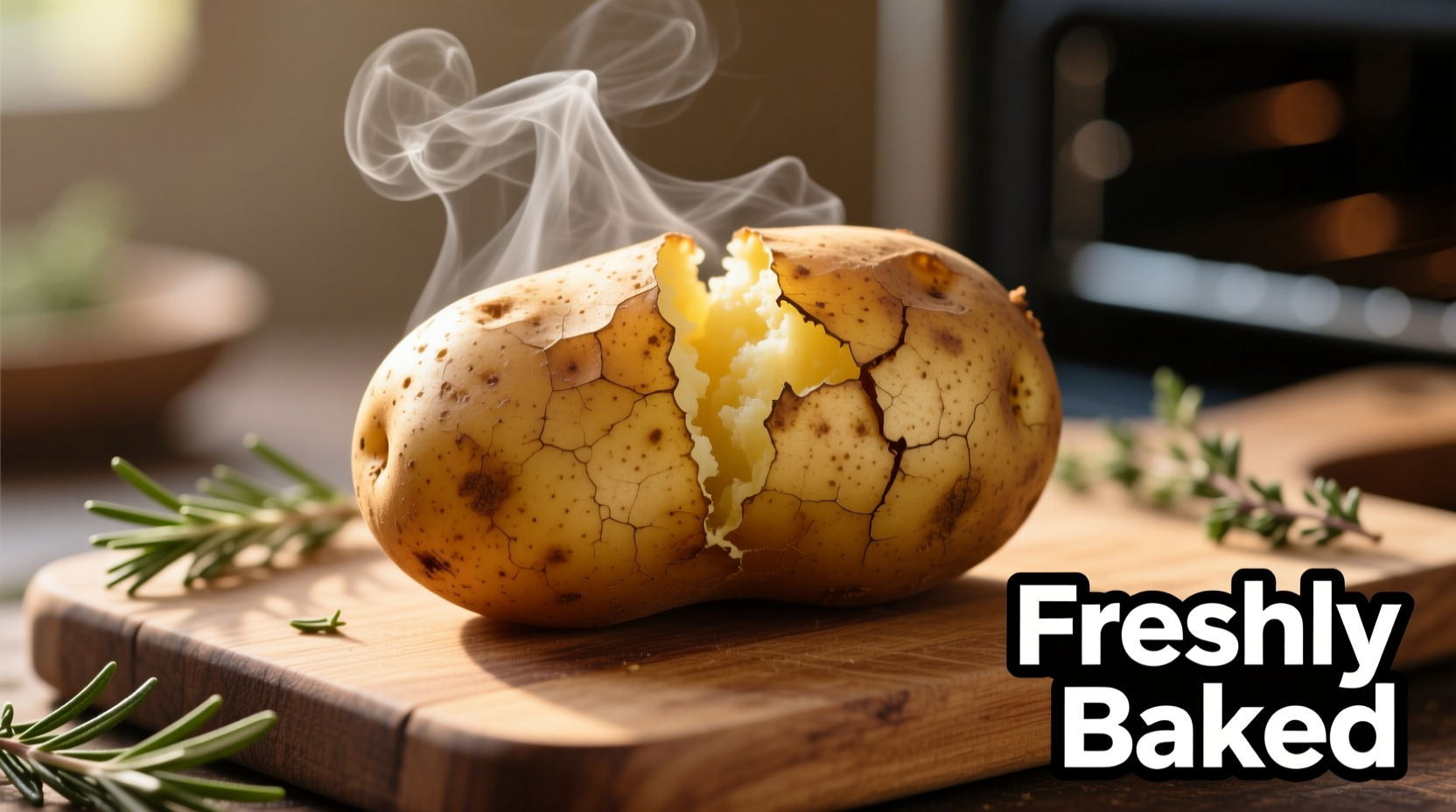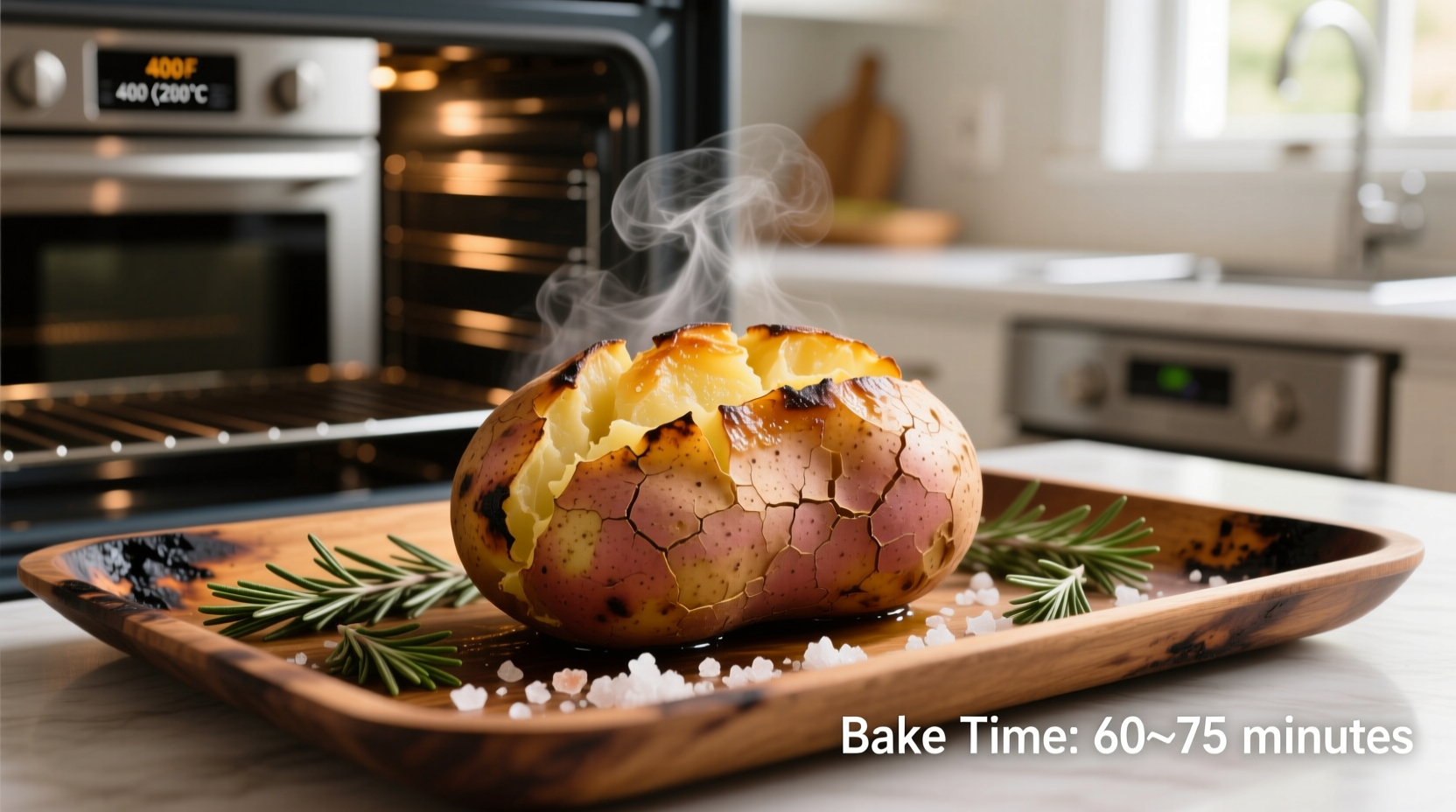Nothing beats the comforting simplicity of a perfectly baked potato, but timing can make or break your meal. Getting the cooking duration right ensures fluffy interiors without dry, overcooked edges. Whether you're meal prepping or cooking for dinner tonight, understanding the variables that affect baking time will transform your potato game.
Factors That Determine Baking Time
While 45-60 minutes serves as a general guideline, several factors influence how long your potato needs in the oven:
Potato Size and Variety
The most significant variable is potato size. Larger potatoes require substantially more time to cook through completely. Russets, the classic baking potato, have high starch content that affects cooking time compared to waxy varieties like Yukon Golds.
| Potato Weight | Approximate Baking Time | Internal Temperature |
|---|---|---|
| 6-8 oz | 35-45 minutes | 205-210°F (96-99°C) |
| 8-10 oz | 45-55 minutes | 205-210°F (96-99°C) |
| 10-12 oz | 55-65 minutes | 205-210°F (96-99°C) |
| 12+ oz | 65-75+ minutes | 205-210°F (96-99°C) |
This fact comparison table reflects data from the USDA's Safe Minimum Cooking Temperatures guidelines, which confirm that potatoes reach ideal texture at 205-210°F internally.
Oven Temperature Accuracy
Many home ovens have significant temperature variations. Using an independent oven thermometer can prevent under or overcooking. Professional test kitchens like America's Test Kitchen found that 30°F discrepancies are common in residential ovens, directly impacting baking times.
Step-by-Step Baking Process
Preparation Checklist
- Wash potatoes thoroughly and dry completely
- Pierce 4-6 times with a fork to prevent bursting
- Rub with olive oil and sprinkle with salt (optional but recommended)
- Place directly on oven rack with baking sheet below to catch drips
Optimal Baking Conditions
Set your oven to 400°F (200°C) for the best balance of cooking speed and texture development. Higher temperatures can burn the skin before the center cooks, while lower temperatures extend cooking time significantly.

Timing Guidelines by Size
Start checking potatoes at the lower end of the time range for your size. The best method is inserting an instant-read thermometer into the thickest part:
- Small potatoes (6-8 oz): Begin checking at 35 minutes
- Medium potatoes (8-10 oz): Begin checking at 45 minutes
- Large potatoes (10-12 oz): Begin checking at 55 minutes
- Extra-large potatoes (12+ oz): Begin checking at 65 minutes
How to Test for Doneness
Don't rely solely on time - use these reliable indicators that your potato is perfectly baked:
- Internal temperature: 205-210°F (96-99°C) is ideal for fluffy texture
- Squeeze test: Gently squeeze (with oven mitts!) - should yield slightly but not collapse
- Knife test: A knife should slide in with no resistance
- Appearance: Skin should be crisp and slightly wrinkled
According to culinary research published by the University of Minnesota Extension, undercooked potatoes remain dense and waxy, while overcooked potatoes become dry and crumbly. The narrow temperature window between perfect and overdone explains why timing precision matters.
Troubleshooting Common Issues
Undercooked Potatoes
If your potato is still hard in the center:
- Return to oven for additional 10-15 minutes
- Check oven temperature with independent thermometer
- Ensure potatoes aren't touching each other (crowding lowers effective temperature)
Overcooked or Dry Potatoes
To prevent dryness:
- Never bake beyond 210°F internal temperature
- Avoid wrapping potatoes tightly in foil (traps moisture and steams rather than bakes)
- Let potatoes rest 5-10 minutes after baking to redistribute moisture
Pro Tips for Perfect Results Every Time
Speed Up the Process
Need potatoes faster? Try these time-saving techniques:
- Microwave for 5 minutes before finishing in oven (reduces total time by 25%)
- Cut large potatoes in half lengthwise for more even, faster cooking
- Use convection setting if available (reduces time by 15-20%)
Flavor Enhancement Methods
Elevate your baked potato with these chef-recommended techniques:
- Rub with olive oil and coarse salt before baking for crispier skin
- Add herbs like rosemary or thyme to the baking sheet for subtle flavor infusion
- Let potatoes rest wrapped in foil for 10 minutes after baking for extra-fluffy interior
When Standard Timing Doesn't Apply
Context boundaries matter for baking potatoes. These situations require adjusted timing:
- Foil-wrapped potatoes: Add 10-15 minutes as foil creates a steaming effect
- Convection ovens: Reduce time by 15-20% due to more efficient heat circulation
- High altitude cooking: Above 3,000 feet, increase time by 10-15% due to lower boiling point
- Multiple potatoes: Add 5-10 minutes when baking more than four potatoes at once
These context-specific adjustments reflect findings from the USDA's Alternative Cooking Methods research, which documents how environmental factors impact standard cooking times.
Storage and Reheating Guidelines
Properly stored baked potatoes maintain quality for 3-4 days in the refrigerator. For best reheating results:
- Refrigerate within 2 hours of cooking
- Store uncovered or with paper towel to prevent sogginess
- Reheat in oven at 350°F for 15-20 minutes for best texture
- Avoid microwaving whole potatoes (makes skin rubbery)
Following these guidelines ensures food safety while maintaining optimal texture. The FDA's Food Safe Storage After Cooking recommendations confirm that proper storage prevents bacterial growth in cooked potatoes.











 浙公网安备
33010002000092号
浙公网安备
33010002000092号 浙B2-20120091-4
浙B2-20120091-4